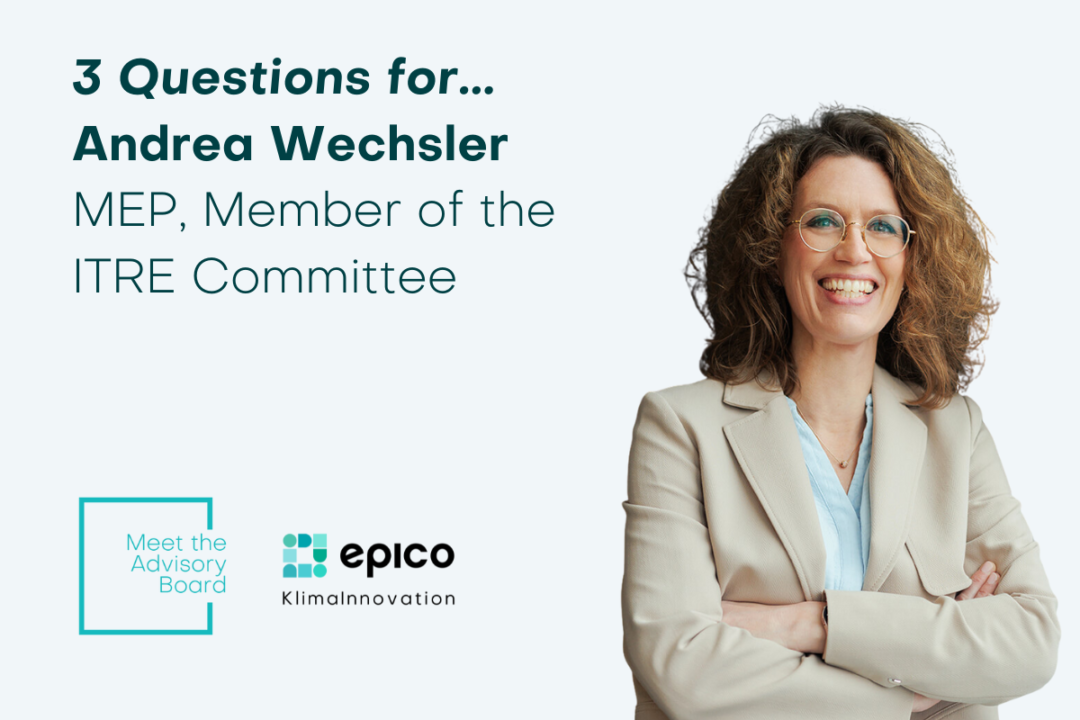EPICO KlimaInnovation is accompanied by a broad-based, independent Advisory Board with high-level members from politics, business, science, and civil society. The Board advises EPICO’s experts on guidelines and the fundamental orientation of the think tank.
With this interview series, we want to introduce the work, expertise, and motivation of each Member of the Advisory Board, as we delve deep into the main questions concerning the future of Europe’s energy transition.

We are pleased to introduce Andrea Wechsler. As a Member of the European Parliament, she is dedicated to shaping a Europe where future generations can continue to live in peace, security, and prosperity—while also driving a competitive, innovative, and strong economy within the European Union.
Andrea, what motivated you to join EPICO’s advisory board?
Europe is facing one of the greatest challenges in its industrial history: achieving climate neutrality by 2050 without jeopardising prosperity and jobs. My involvement with EPICO’s advisory board stems from my strong belief that market-driven mechanisms and technological progress are key to a successful and competitive energy and climate policy. EPICO bridges innovation with political influence, providing a powerful network to develop viable solutions.
European industry is under immense competitive pressure. Between 2021 and 2023, China invested approximately $268 billion in low-emission power generation, while the US is actively promoting climate-friendly technologies through the Inflation Reduction Act. Meanwhile, Europe lacks a coherent strategy to secure its industrial base and maintain its technological leadership.
This is where EPICO plays a crucial role: as a think tank, it develops strategies that align climate action with economic strength, advocating for technological openness rather than rigid regulation.
I am particularly drawn to EPICO’s interdisciplinary approach. The combination of scientific expertise, industrial experience, and political implementation leads to solutions that are both ambitious and pragmatic.
Europe has the potential to become the world’s first climate-neutral industrial powerhouse—but only if the right course is set now.
How should Europe strategically respond to Trump’s ‘America First’ policy?
Europe must achieve strategic independence through innovation. Instead of Trump’s “Drill, Baby, Drill” approach, we need targeted investments in renewable energy, particularly hydrogen, quantum technology, and semiconductors. A coherent European hydrogen strategy and strategic AI investments are essential for maintaining global competitiveness.
At the same time, Europe must cut through its bureaucratic jungle. Trump’s “Drain the swamp” slogan is relevant here too: reporting requirements should be reduced by at least 25%, and national regulations, such as Germany’s supply chain law, should be revised or abolished. Less bureaucracy will strengthen businesses and accelerate innovation.
Europe must not downgrade itself to a junior partner of the US. Instead, it needs assertive trade agreements like Mercosur and CETA, alongside a robust investment programme to bolster the single market. International climate partnerships will be crucial in building a sustainable economy with global reach.
While Trump may dismiss climate change as a ‘hoax’, Europe must take the lead. Economic strength, innovation, and geopolitical assertiveness are key to ensuring that the EU is respected by the US and remains competitive—without compromising its climate goals.
What measures are needed to ensure Europe meets its climate targets while remaining economically competitive?
Europe can only achieve effective climate protection through economic strength and technological innovation—not through bans and bureaucracy. Businesses require competitive energy prices and clear, investment-friendly regulatory frameworks.
An efficient emissions trading system (EU-ETS) must drive CO₂ reductions through market mechanisms without stifling innovation. At the same time, Europe must embrace technological openness: renewables, hydrogen, nuclear power, bioenergy, and carbon capture and storage (CCS) technologies should all be equally supported. A modern, smart energy infrastructure with high-performance storage solutions is essential for energy security.
The EU must cut bureaucracy and streamline its “Fit for 55” package. Faster approvals and simplified regulations are crucial. Investments in research, digitalisation, and energy efficiency should be prioritised. At the same time, deepening capital markets is essential to mobilise private funding.
Europe cannot afford isolation—it needs strategic energy partnerships and a diversified supply chain. Cybersecurity and digital energy solutions will enhance resilience, while businesses and consumers must be actively engaged in the energy transition.
Competitiveness and climate protection are not mutually exclusive. With market-based solutions, technological openness, and a clear industrial strategy, Europe can take a leading global role—shaping a sovereign European energy policy for the future.
At EPICO, we are actively addressing key energy transition challenges. We believe that climate and energy policy driven by competition and innovation is essential to efficiently reducing CO2 and other greenhouse gases, while also balancing environmental protection, sustainable economic growth, and socially just equitable outcomes. Discover our latest publications, and upcoming events, and stay tuned for more Advisory Board interviews.
